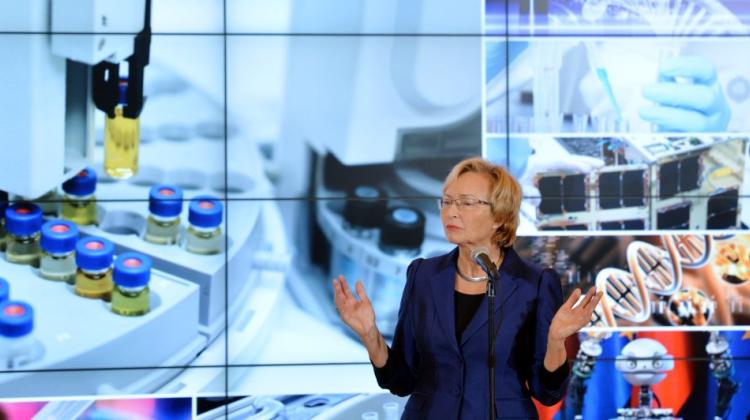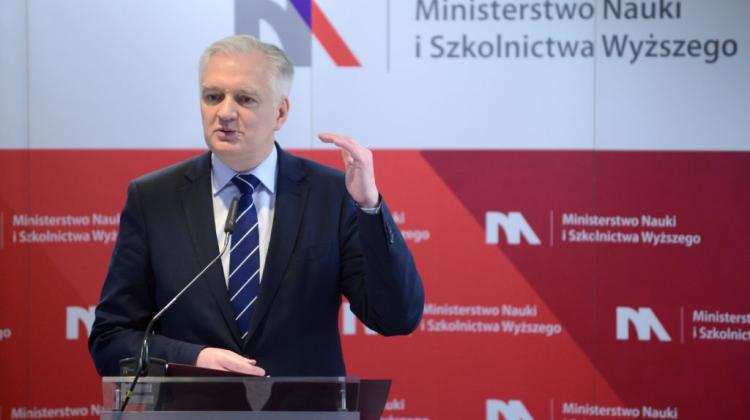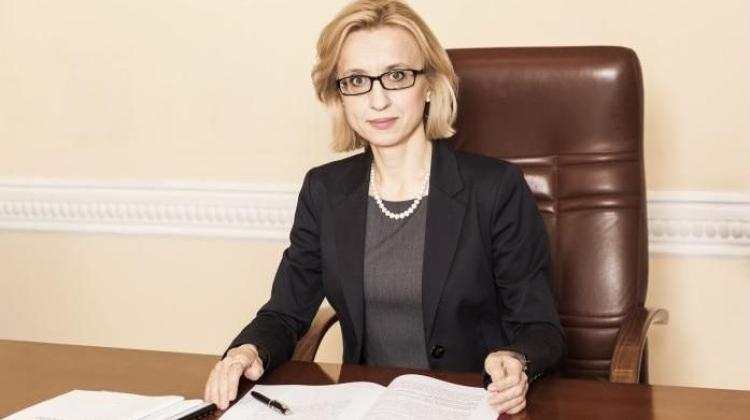Minister of Science: We have to select a group of elite universities

In 2014, the Ministry of Science will start talks about the concept of education funding. We must select a group of elite universities, regardless of whether they be public or private. This requires a new system of financing both sectors, Minister of Science told PAP.
In an interview with PAP, Minister of Science and Higher Education Prof. Lena Kolarska-Bobińska noted that private universities should be more proactive in seeking to obtain grants for the maintenance of research capacity. She did not rule out including courses in social sciences and the humanities in that the new list of ordered courses.
PAP: What are the major directions of activity of the Ministry of Science under your leadership? Are there any issues that you want to specifically address?
Prof. Lena Kolarska-Bobińska: It is important to more fully involve our science in processes that determine the development of Poland and Europe. It will not work without more innovation and creativity of science, and better use of its results. Research, especially applied research, must better serve the economy, and basic research also the social development. The key is to internationalise: involve more Polish scientists in groundbreaking international projects, have more foreign students and faculty at Polish universities, compete more effectively for EU funds. As you can see, our academic success is not only the result of creativity of individual teams, but also the cooperation and joint effort of many institutions. We must fight so mistrust and unwillingness to cooperate, deeply rooted in Poland.
PAP : During the last meeting of the Council of Ministers, the government adopted draft amendments to the laws on higher education and the financing of science. When will the Sejm consider them and when you would like their provisions to come into force? What happens with the amendment to the Law on Public Procurement, which the government adopted in July?
L. K.-B.: The Sejm will start working on these amendments in January. We want the amendments to come into force in the beginning of the next academic year. In addition, we have expedited the Law on Public Procurement. It was combined with the whole package of other laws, but we managed to agree on a fast legislative track for science. Scientists will be exempt from tenders up to the threshold of 130,000 euros for research institutes and 200,000 euros for universities. I hope that these regulations come into force by April.
PAP : Recently, the Constitutional Court ruled that the rules for granting statutory grant to private universities should be regulated by law. Does the Ministry of Science already know how to this ruling should be reflected in legislation?
L. K.-B.: The Court held that to decide determining the conditions of subsidizing non-public universities in the regulation would be unconstitutional. In the amendment recently adopted by the government, we removed this provision. But it does not change the fact that we need to work on a vision for higher education for the next decade, and funding is an important pillar of this work.
This problem has been being put aside for many years. Now, together with the public and private universities community, external experts, we need to deal with it. The demographic decline means that private universities more and more eagerly demand that the state finances their full-time studies. We do not say "no", but we ask, what objectives should higher education pursue in changing social and economic conditions . Private universities would have to undergo a similar rigor that today determine the funding for public universities. I can not imagine this discussion without the key question about the quality of studies and the method of its assessment. In the beginning of the year we will decide in what team we will work on that.
PAP: Can private universities count on the increase of budgetary resources, which will benefit them?
L. K.-B.: European funds will certainly increase. We need to think how to include private universities more in their use. In addition, private universities can already use a number of the existing budget streams. They receive a grant for students for scholarships for social aid and academic performance, all the structural and pro-quality grants are awarded to them on the basis of the same rules as to public institutions. Annually, they receive half a billion zlotys from the state budget! I feel that putting more emphasis on the quality of teaching and research, they could even more funds from the state budget. We analysed how private universities use statutory grants for maintaining research capacity. They receive only about 6 million out of 1.8 billion zlotys.
PAP: You mentioned that the research should become a driving force behind the development of the Polish economy. However, according to many observers, cooperation between business and science is at a very low level. Are there any new ideas for stimulating this cooperation?
L. K.-B.: This cooperation is getting better every year. Enterprises are becoming more active and see their future and development in research. Universities, in turn, confirm that entrepreneurs approach them more often with offers of cooperation. Since 2012, we have observed a clear increase of spending on research and development in the private sector. This is also due to the fact that the competitions of the National Research and Development Centre (Narodowe Centrum Badań i Rozwoju, NRDC) required that. We said that we would give public money for a research project under the condition that the private sector would also make a contribution. Now we want venture capital funds to contribute as well. The NRDC is working on competitions that will strengthen the final stage of implementation. This will be aid for solutions that have the potential and can be forged into a new technology, but need a business partner who would take a chance and invest in such idea.
PAP: Are there any changes planned to the ordered courses programme? Authors of the report of the Polish Agency for Enterprise Development and the Jagiellonian University pointed out the not quite favourable situation of graduates of these courses.
L. K.-B.: Positive reviews still prevail, for example in the Study of Human Capital report. NRDC is currently carrying out a detailed analysis of the effects of the government ordered courses programme. This will tell us exactly what works, and what needs to change. I do not rule out including courses in social sciences and the humanities in that the new list of ordered courses. But decisions will be made only after we look at the impact assessment of the program.
PAP: Does the ministry plan to introduce incentives for the consolidation of public universities, which, according to many opinions, could help them survive the time of the demographic decline?
L. K.-B.: Universities have already started to restructure and seek ways to deal with the crisis. So far, these are mainly talks about interdisciplinary, intercollegiate studies. In the recently adopted draft amendments we are trying to facilitate this. Consolidation bonus is also incorporated in the algorithm that determines the amount of the grant, which translates into a real gain in the case of university consolidation.
PAP : Are there changes among those introduced in recent years, which should be reconsidered, corrected? One of the most controversial provisions is the introduction of payments for the second course of study, which is waiting for the decision of the Constitutional Court.
L. K.-B.: There were many different changes and regulations recently. For now, we do not want to make any amendments, and this also applies to charges for the second course of study. I would prefer to first carefully assess legislative changes and see if they bring the expected results.
PAP - Science and Scholarship in Poland, interview by Ewelina Krajczyńska
ekr/ agt/ ura/ mrt/
tr. RL
Przed dodaniem komentarza prosimy o zapoznanie z Regulaminem forum serwisu Nauka w Polsce.


















